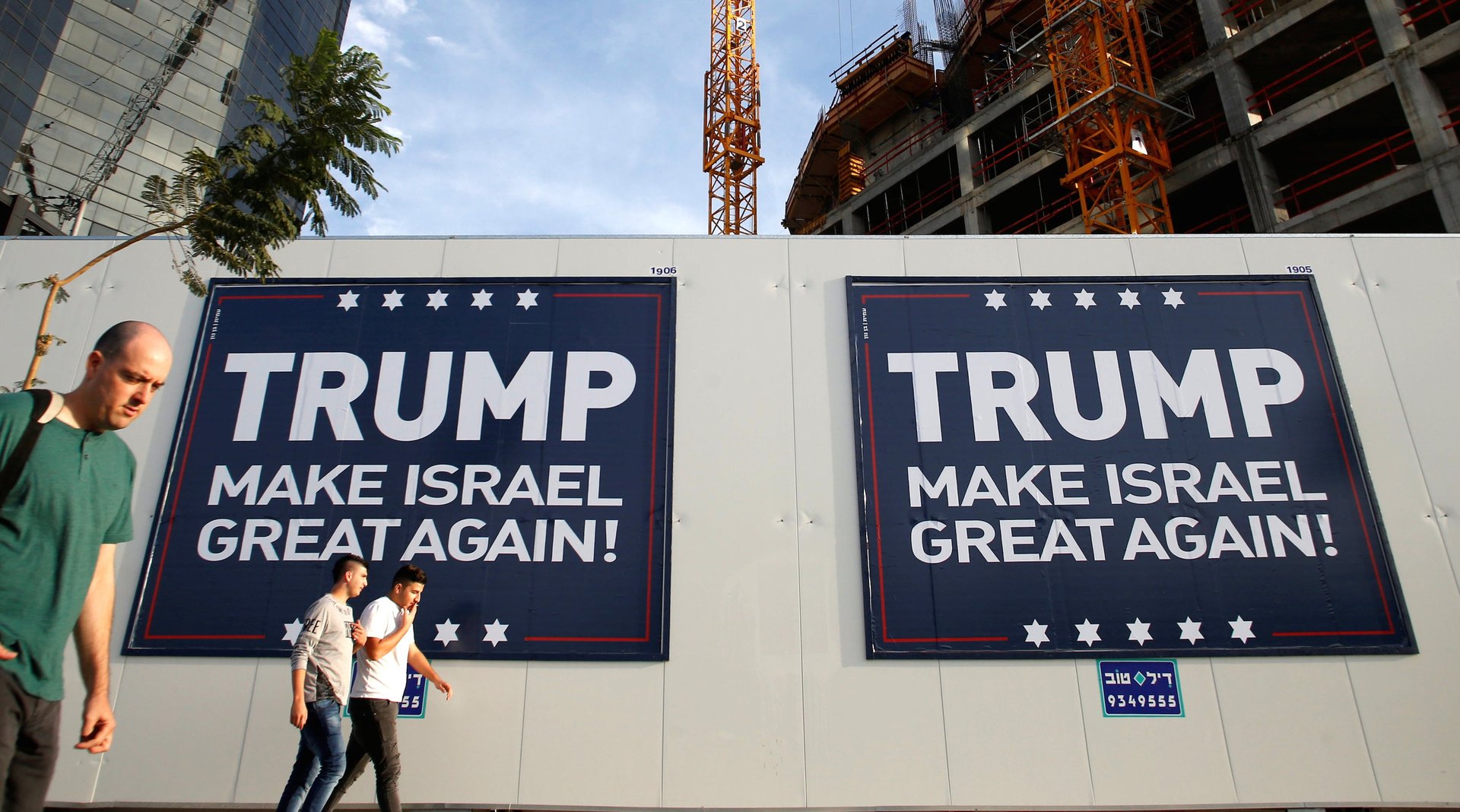Israel and Palestine won’t get a two-state solution under Donald Trump. But they may get something better
Donald Trump’s nominee for US ambassador to Israel, David Friedman, holds some surprisingly noxious views, even toward his fellow Jews. Never mind halting Israeli settlement construction, Friedman hails Jerusalem as the “eternal, undivided capital of Israel.”


Donald Trump’s nominee for US ambassador to Israel, David Friedman, holds some surprisingly noxious views, even toward his fellow Jews. Never mind halting Israeli settlement construction, Friedman hails Jerusalem as the “eternal, undivided capital of Israel.”
In other words, he doesn’t believe in a two-state solution for the Israeli-Palestinian conflict.
But while Friedman’s hawkish tendencies are sure to frustrate liberals in Washington and the rest of the West, the reality is that the two-state-solution ship sailed a long time ago.
Establishment policymakers in the West still believe that the creation of a Palestinian state alongside Israel is not only possible, but desirable. This stance conveniently ignores the fact that there’s little plausible chance a Palestinian state would survive. While I certainly wouldn’t want Friedman in charge of peace talks, he may inadvertently have pushed the reconciliation process in the right direction—the question is not whether we should implement a one-state solution, but rather what a potential one-state solution might look like.
At this point, the deck is stacked against any plan that attempts to separate Israelis and Palestinians into two distinct and equally sovereign countries. For one thing, there’s no settling the conflict without addressing the plight of Palestinian refugees currently living outside the borders of “Mandatory Palestine.” Whether they return and where they return to is a challenging question. Nor can we merely address the ongoing siege of Gaza or the cantonization of the West Bank without also considering the second-class citizenship many Israeli Palestinians suffer.
Even if these questions were resolved, where would Jewish settlers go? How can an Israel that has built an entire architecture of settlements that house more than half a million people possibly summon the political will and the economic resources to absorb those people, a significant number of whom hold radical opinions? And of course there’s the question of what would happen to Jerusalem’s Old City, a site revered by Jews around the world, as well as some 1.5 billion Muslims. How could such a small, sacred city be plausibly divided between two fully independent nations?
Most critically, no Palestinian would accept a state that is not capable of defending itself, not least to protect itself from the possibility of renewed occupation. Yet, understandably, no Israeli would feel comfortable with a militarized Palestinian neighbor. Israel would continue to oversee Palestine’s external boundaries, which would mean, of course, that Palestine would not really be an independent country, but a ward of Israel.
So while a two-state solution might mean greater Palestinian autonomy in key areas, it would not bring about real independence; indeed, the deceptive fiction of independence would only make it harder to redress grievances and resolve disputes new or old.
But a one-state solution is in Israel’s better interest, too.
Israel exists in a precarious neighborhood, overflowing with sectarian tensions, sophisticated extremist groups, and cross-border violence. Some use this as an argument against reconciliation with Palestinians. I believe this is the wrong conclusion. The longer the Palestinians are made to feel hopeless (and the appointment of a US ambassador who entirely overlooks their existence is unlikely to help matters), the more dangerous the situation becomes.
All around the Middle East, we see a common pattern. States are collapsing because they have failed to be sufficiently pluralist. It is not diversity that dooms a state, but its inability to insufficiently manage and reflect pluralism. In the worst cases, internal revolt and strife invites or permits foreign interference, dramatically escalating the violence. For religious minorities, that can present an existential threat.
In Egypt, fear of the Muslim Brotherhood led many Egyptians to back a coup that has resulted in an even more authoritarian state, which in turn is radicalizing a new generation of jihadists. In Iraq, tensions between Sunni and Shi’i Arabs—and on top of them Kurds, Yezidis, and Turkmen—frequently erupt into violence due to a lack of competent, inclusive leadership. In Syria, minority rule exploded into catastrophic war, which threatens every few weeks to tilt into an all-out global conflagration.
Now is not the time to double down on occupation, as Friedman proposes. Instead, we need to do the opposite: The greatest guarantor of a society’s stability, prosperity, and sovereignty is its ability to provide all those under its rule with a genuine sense of dignity and equality.
Instead of erasing national, cultural, or religious differences, Israel needs to find an intelligent way to forge a shared future. This future nation would likely need to be transformed into a binational state with significant degrees of autonomy for its diverse citizenry collectively, and robust rights for the individual. While challenging, such multinationalism, religious diversity, and ethnic and racial diversity wouldn’t be out of place in many parts of the world—take India or Indonesia, for example—even if it might appear alien to those raised on the limiting diet of ethnic mononationalism.
Palestinians have long deserved justice and a fair redress for their legitimate grievances. Meanwhile, Israel cannot expect to survive in a troubled neighborhood while also remaining vulnerable to internal unrest and agitation. With the window on the two-state solution essentially closed (as it has been for some time now), those who care about pluralism, democracy, and decency must hurry up before is becomes too late for a one-state solution, either.